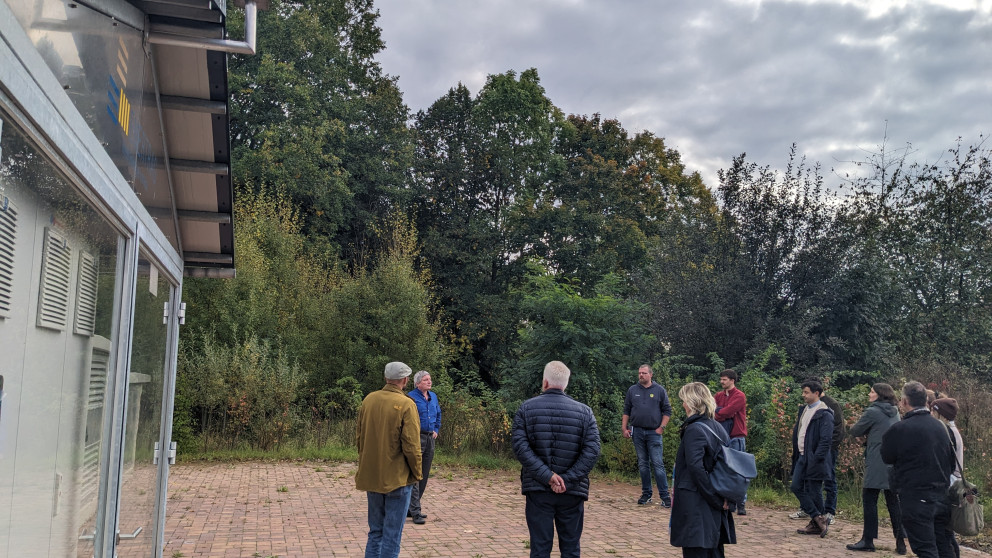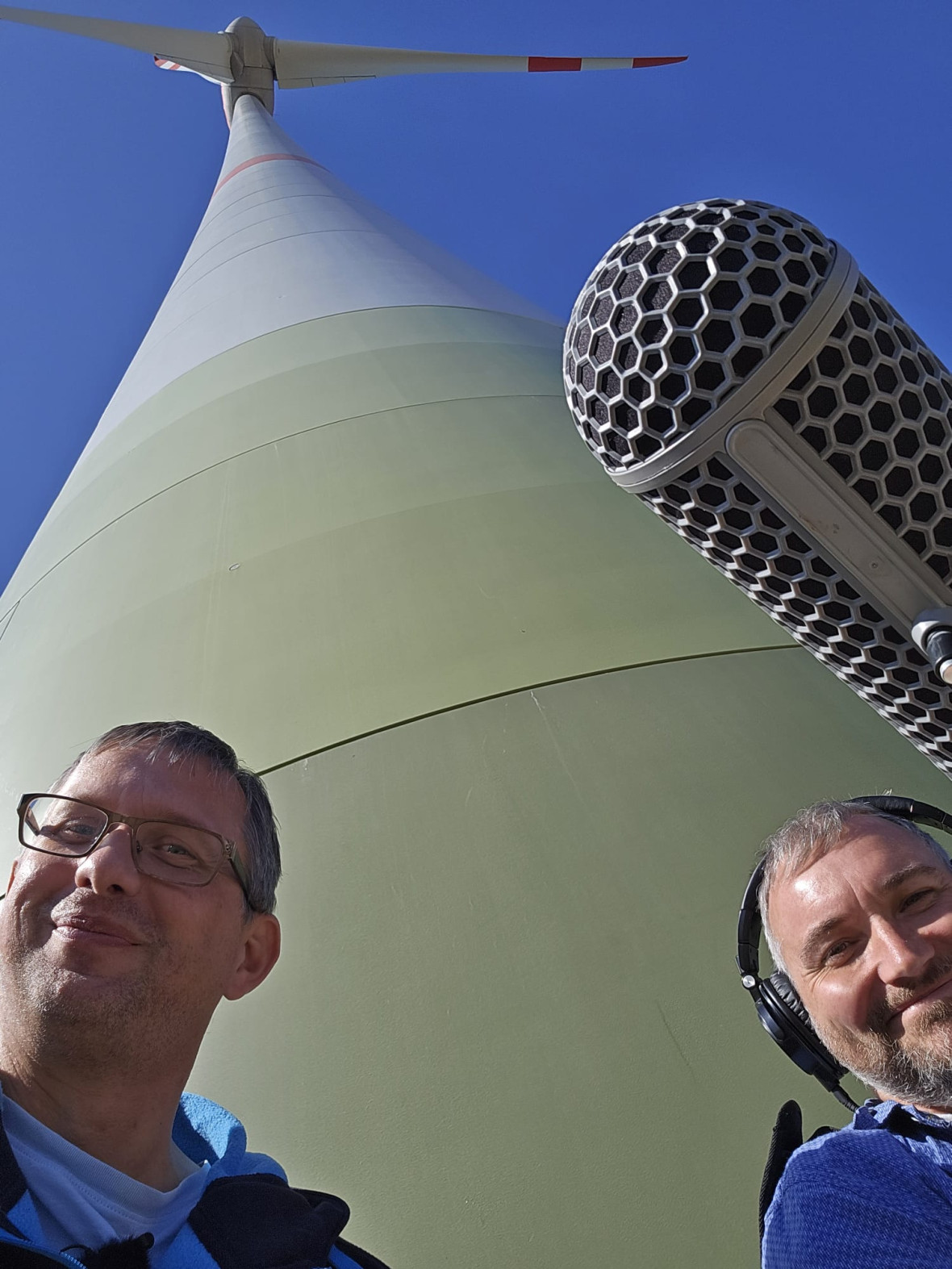Regional value added through financial participation in the energy transition?!
29.10.2024

"Wandel verhandeln" (Negotiating Change) is a German-language podcast about Brandenburg's transformation towards a sustainable and fairer society. In the podcast, we and our colleagues take a closer look at the conflicts that arise in connection with this transformation – but also at the positive impacts and new ideas – and invite changemakers and people in the community to have their say. An episode about Sharing the Financial Benefits of the Energy Transition: The Wind Energy Levy will be released today on several streaming platforms.
How are strategies for sustainable development implemented in Brandenburg? What obstacles are slowing progress? And what positive impacts are already evident? In a new German-language podcast – “Wandel verhandeln. Nachhaltig in Brandenburg” (Negotiating Change. Sustainability in Brandenburg) – RIFS researchers are looking for answers.
The complete conversion of our energy system from fossil fuels to renewable energy sources is an important cornerstone of the sustainability transformation. Wind power has established itself as the most important source of energy, far ahead of coal and other fossil fuels. In the first half of 2024, renewable energies accounted for 61.5% of total domestic electricity production, with wind energy alone accounting for 33% (destatis 2024). However, further expansion is needed to achieve the climate targets.
Wind energy: Central role in Brandenburg's energy Transition
Wind energy also plays a central role in Brandenburg's energy transition. In some rural areas of Brandenburg, there are already a large number of wind turbines – which make the transformation process directly tangible for local residents. In fact, in recent years, there has been widespread local resentment about the expansion. Although there is broad support for the expansion of renewable energies (SNB 2023), the specific impacts, such as landscape changes, are borne primarily by the rural population, who often have little to gain from the developments.
To counteract this, a special levy for new wind turbines was introduced at the state level in June 2019. The Wind Turbine Levy Act (BbgWindAbgG for short) obliges operators to pay an annual special levy of EUR 10,000 to municipalities within a radius of three kilometers (pro rata). The aim of the state government is to create additional local added value for municipalities through the further expansion of wind energy and thus to increase local social support. In addition to the mandatory special levy in Brandenburg, the federal government has stipulated a voluntary payment of 0.2 cents per kilowatt hour of electricity generated from wind and solar energy systems for the affected local municipalities as part of the Renewable Energy Sources Act (EEG 2023 - §6).
In any case, these regulations are linked to the hope that the financial participation of municipalities will lead to a more positive perception, more local acceptance and ultimately an acceleration of the expansion of renewable energies. In fact, a recent survey of mayors showed that the prospect of financial revenue is an important driver for municipalities to advance local renewable energy projects (IKND 2024). These additional funds are important for the affected municipalities, which are often over-indebted or have limited resources, because they can be used for a variety of purposes (in some cases even for non-specific purposes), such as enhancing the local image and local infrastructure, promoting municipal events, or supporting associations and social infrastructure in general.
RIFS researches how financial participation models work
The team of the research group “Democratic Governance and Agency” at the RIFS has set itself the goal of investigating the impact of such financial participation models in more detail. This study is part of further surveys, including one as part of the BePart project, in which the effects of participation in energy projects are quantified. For the podcast, we talked to various stakeholders to find out what opportunities and challenges arise from the implementation of this legal regulation.
A central point in the discussion with local representatives was the tension between regional added value, local acceptance and an accelerated energy transition. Annett Hartwig, head of the Brüssow office, a small municipality in the Uckermark region, emphasizes: “the citizens have to be taken along. And something has to [...] stay here, where the wind turbines are. Absolutely!”
In fact, in many regions of Brandenburg, the wind turbines and the corresponding areas are privately owned. This means that the added value for the broader local population or municipality is very low or not noticeable. What the local people do notice, however, is a decaying infrastructure, with schools and kindergartens closing. Here, the financial participation of the municipality can help somewhat. However, it is only this year that money has started to flow to the municipalities, so that experience to date is still limited.

Nevertheless, various examples from the regions already show how regional added value is being created and that proactive action promises success. Jens Hinze, honorary mayor of the municipality of Mühlenfließ (see picture), presents a special land lease model for 22 wind turbines in his region. This means that all landowners in the suitable area (including those on whom the plant is not located) receive a share of the lease and it is ensured that the income is distributed fairly on the ground, without favoring a few owners. In addition, a community foundation Schlalach (2010) was founded, which is financed by the income of wind turbines and supports charitable projects such as youth work, care for the elderly and the support of local associations. Hinze particularly emphasizes the collaborative action that paved the way for this model: “and the owners got together and said, well, we just want to make a collaborative issue out of it.”
Another model for regional value creation comes from the north of the country and was presented by Uckerlands' mayor Matthias Schilling (see picture). The research group traveled to Nechlin, a small town in Uckerland – almost in Mecklenburg-Western Pomerania. Here, the wind turbine operator and the municipality have broken new ground with an innovative solution to create added value for the population and strengthen acceptance of wind power expansion. In 2021, a so-called wind heat storage system was put into operation, which diverts excess “regulating current” from the neighboring wind turbines (i.e., electricity that cannot be fed into the grid due to capacity constraints) into a power-to-heat system that feeds a decentralized local heating network. Around 40 households benefit from cost-effective heat and can save up to €2,000 per year. The mayor hopes that this model from Nechlin will be adopted in other parts of Uckerland and financed by the special wind tax. Schilling also emphasizes that in structurally weak regions, the population should particularly benefit financially.
A fair distribution of costs and benefits is one of the main topics of the discussions. This is especially important because Brandenburgers pay some of the highest electricity prices in the country, which is due to the high grid fees resulting from the expansion of renewable energies. These and other challenges must be addressed in rural areas as part of the energy transition
We were able to determine that financial participation in the expansion of wind energy can create new opportunities for municipalities. However, it is not a panacea. It remains to be seen what concrete effects the special levy or the EEG regulation (§6) will have. We have heard that local people want to be informed about developments in a timely manner and actively involved in decisions. Trust and transparency play just as important a role here as financial incentives. Only in this way can sustainable and fair solutions be found for the challenges of the energy transition in rural areas.

